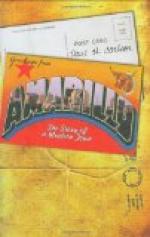“Oh, Tilly,” she gasped; “oh, Tilly, ain’t you moved?”
“No, nor we ain’t going to move, ma—that’s the surprise! I took the money I’d saved for moving, for the new carpet and new dishes; and the Lossings they papered and painted. I was so ’fraid we couldn’t get done in time. Alma and all the boarders are coming in pretty soon to welcome you, and they’ve all chipped in for a little banquet at Mrs. Carleton’s— why, mother, you’re crying! Mother, you didn’t really think I’d move when it made you feel so bad? I know I’m set and stubborn, and I didn’t take it well when Mr. Lossing talked to me; but the more I thought it over, the more I seemed to myself like that hateful Minnie. Oh, mother, I ain’t, am I? You shall do just exactly as you like all the days of your life!”
AN ASSISTED PROVIDENCE
It was the Christmas turkeys that should be held responsible. Every year the Lossings give each head of a family in their employ, and each lad helping to support his mother, a turkey at Christmastide. As the business has grown, so has the number of turkeys, until it is now well up in the hundreds, and requires a special contract. Harry, one Christmas, some two years ago, bought the turkeys at so good a bargain that he felt the natural reaction in an impulse to extravagance. In the very flood-tide of the money-spending yearnings, he chanced to pass Deacon Hurst’s stables and to see two Saint Bernard puppies, of elephantine size but of the tenderest age, gambolling on the sidewalk before the office. Deacon Hurst, I should explain, is no more a deacon than I am; he is a livery-stable keeper, very honest, a keen and solemn sportsman, and withal of a staid demeanor and a habitual garb of black. Now you know as well as I any reason for his nickname.
Deacon Hurst is fond of the dog as well as of that noble animal the horse (he has three copies of “Black Beauty” in his stable, which would do an incalculable amount of good if they were ever read!); and he usually has half a dozen dogs of his own, with pedigrees long enough for a poor gentlewoman in a New England village. He told Harry that the Saint Bernards were grandsons of Sir Bevidere, the “finest dog of his time in the world, sir;” that they were perfectly marked and very large for their age (which Harry found it easy to believe of the young giants), and that they were “ridiculous, sir, at the figger of two hundred and fifty!” (which Harry did not believe so readily); and, after Harry had admired and studied the dogs for the space of half an hour, he dropped the price, in a kind of spasm of generosity, to two hundred dollars. Harry was tempted to close the bargain on the spot, hot-headed, but he decided to wait and prepare his mother for such a large addition to the stable.
The more he dwelt on the subject the more he longed to buy the dogs.




